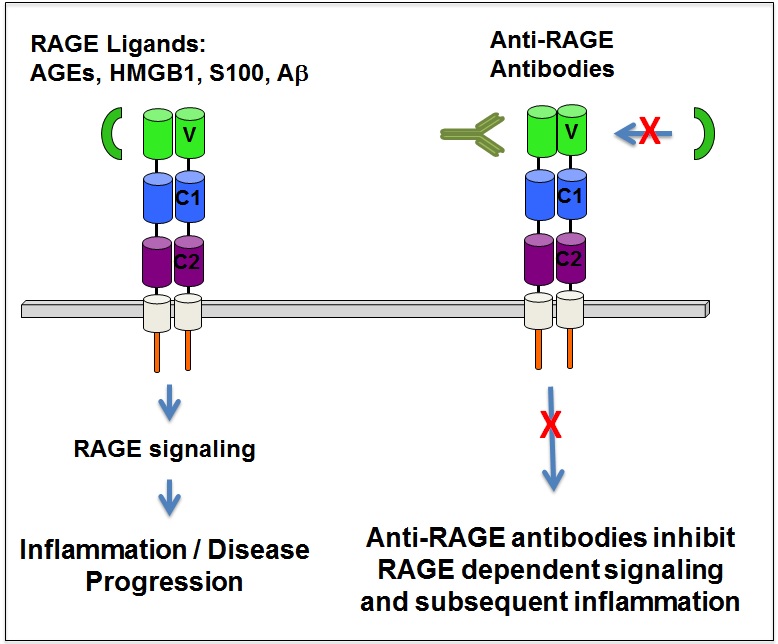Monoclonal Antibody Against the Receptor for Advanced Glycation Endproducts (mRAGE) (RFT-432)
Invention Summary

Scientists at NDSU have developed a monoclonal antibody that inhibits activation of the receptor for advanced glycation end products (RAGE). The antibody binds the V-domain to block activation of RAGE by its ligands. This antibody has delayed tumor growth in a xenograft melanoma model. The V-domain can bind multiple structurally and functionally diverse ligands to trigger signal transduction by RAGEs cytosolic domain and results in sustained inflammation that is associated with diabetes, cancer, Alzheimer's, multiple sclerosis, and other diseases.
RAGE induced signal transduction pathways. Upon engagement with its ligands, RAGE stimulates the activation of a diverse array of signaling cascades, including mitogen-activated protein kinases (MAPK), c-Jun N-terminal kinase (JNK), phosphoinositol 3-kinase (PI3K/AKT). RAGE also triggers activation of nuclear transcription factors, including nuclear factor NF-κB, and consequent target gene transcription. As a result, the anti-RAGE monoclonal antibodies have the potential to treat a wide variety of diseases, and in some cases might reduce or slow disease progression.
Benefits
-
Reduce or prevent triggering the RAGE inflammation cascade
- In some cases, may be able to reduce or slow disease progression
-
Highly specific binding to the RAGE V-domain, so non-target binding, and resulting side-effects, are minimized
-
High-affinity binding, potentially enabling treatment with 'lower' dosage
-
Can be used as a carrier for additional targeted drug delivery
Applications
-
Therapeutic treatment of multiple diseases where chronic inflammation is a cause of the disease, disease progression, and/or disease symptoms
-
Additional attachment of small molecules to broaden active ingredient functions
-
Research uses for studying RAGE and its ligands
Licensing Status
The antibody has been non-exclusively licensed to multiple licensees for research purposes but is available for licensing for therapeutic and diagnostic purposes.
Contact:
NDSU Research Foundation
info(at)ndsurf(dot)org
(701)231-8173
Downloads
Download the technology summary(PDF, 302.36 KB)
NDSURF Tech Key
RFT, 432, RFT432
Inquire about this technology >